Summary 
Six performers play twenty characters in a heavily edited adaptation that is sometimes amateurish and occasionally embarrassing, the non-Shakespearean supposed comedy ranging from insipid to sophomoric to just plain vulgar. More an improvisational acting exercise or a demonstration of quick-change gimmickry than a fully realized production of a play, this eighty-minute show feels like a theatrical marathon in its incessant mugging and pubescent sensibilities.
Design
Adapted and directed by Sean Graney. Set by Tom Burch. Costumes by Jacqueline Firkins. Lights by Heather Gilbert. Sound by Michael Griggs.
Cast
Erik Hellman (Antipholus of Syracuse/Antipholus of Ephesus/Egeon), Alex Goodrich (Dromio of Syracuse/Dromio if Ephesus/Emelia the Abbess), Stacy Stoltz (Adriana/Merchantess), Elizabeth Ledo (Luciana/Luce/Town Crier), Steve Wilson (Duke/Balthazar/Merchant), Kurt Ehrmann (Angelo/Doctor Pinch/Courtezan).
Analysis
Sean Graney of Chicago's The Hypocrites adapts and directs The Comedy of Errors at the venerable Court Theatre on the campus of the University of Chicago. Graney's production adds modernized dialogue and situations but moreso cuts deeply into Shakespeare's play, chopping the tale of mistaken identities into eighty minutes without an intermission. The staging represents the socio-economic squalor of Ephesus, an urban locale of cement slabs and stone steps littered with trash and yellowed newspaper. A sickly streetlight and bare bulbs in broken fixtures illuminate a grim upstage wall of boarded up-windows, peeling posters - "down with Syracuse" - and grimy artwork hanging both upside-down and sideways.
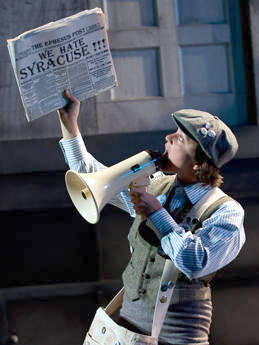
Graney sets the scene with the entrance of the Town Crier, a surly kid on a scooter hawking newspapers and barking headlines into a bullhorn. The offstage cast boos Syracuse and cheers Ephesus, and once Egeon is hustled by a cop offstage - after posting bright red "Lost Son" signs on the upstage wall with a staple gun - the Antipholus and Dromio from Syracuse arrive, emerging from a stage left sewer grate.
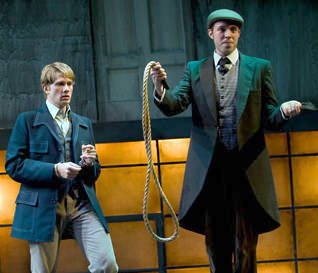
Graney employs a cast of only six performers to play the twenty characters in his truncated Comedy, and they tackle their roles with occasional energy, but inspired moments are few and far between. Graney's adaptation is overburdened with insipid humor as if from an improvisational Second City exercise, and while the friends of the cast and crew in the audience may hoot and holler and seem thoroughly entertained, most of the new material consists of dreadful comic bits enacted with a droll enervation that is immediately tiresome. For example, the father of the lost twins, Egeon, announces he has arrived from Syracuse, "and boy are my arms tired," and one Antipholus sends his servant scampering to "Rope Depot" for a rope to secure the supposed town crazies. Graney includes a running joke with Antipholus and Angelo draining their beer cans, crushing them in their fists, and then hurling them over the upstage wall, with their fellow merchant unable to complete the tough-guy throw, and during the late melee with a sword and a baseball bat, Angelo accidentally stabs the merchant under the arm. The accidental stabbing becomes an over-extended routine, with the merchant sobbing and Angelo apologizing as he pulls the sword out, then sneezes and re-stabs the merchant, who groans but gives a "God bless you." When he returns near the curtain call, the sword still sways from his armpit, and he swigs from a bottle of water, some of the liquid leaking from the back of the "wound."
Graney's adaptation (other than the heavy edits of text) mostly consists of the addition of interruptive asides - Antipholus annoyed, "I'm in the middle of my soliloquy!" or Luciana to the audience, "you all know what I'm talking about!" - that shorten dialogue passages and muddle the pace. The colloquial asides, like the beat cop muttering about Egeon, "too bad, he seems like a nice guy" - lack cleverness and add little to situations. For example, an offstage citizen of Ephesus shouts "I hate that guy!" when the Town Crier mentions the Duke of Syracuse, and after the unintelligible Doctor Pinch only grumbles and mumbles repeatedly, one of the Dromios merely cracks, "thank you, we're gonna get another opinion." The humor too often slips into the sophomoric, worse than silly and far from funny: the Town Crier warns the cop about "Syra cooties"; a Dromio pulls a carrot from his pocket at the line about eating the insane root; during the comparison of Luce's body to the world globe, Dromio shouts a Braveheart-like, "you can take my jokes but you'll never take my Freedom!"; and Angelo squares off with the Merchantess to theme music from The Good, the Bad and the Ugly. Other sequences fail altogether: Antipholus of Ephesus eats Chinese food with his fingers from a white cardboard container, and after he is arrested and handcuffed by the surly policeman, the cop pulls a pair of chopsticks from a uniform pocket to continue eating; and the other Antipholus cries out for country suggestions from the audience, then ignores them, sending Dromio into the front row to encourage a call for The Netherlands.
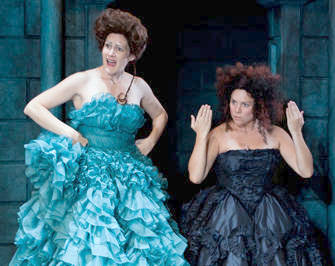
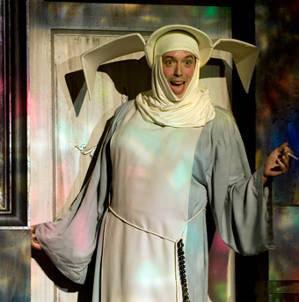
The costuming continues the over-the-top hamminess of Graney's approach. Egeon wears a fake beard and a heavy gray wig, looking like a dirty old man in his long worn overcoat. The style seems to hearken the 1970s, with the Duke and the merchants in long hair, white shoes, flared pants, leather vests and pormstar mustaches. Adriana and Luciana wear oversized and poofy gowns like disco-era prom dresses, and the other women are absurdly attired: Luce wears a big fright wig with glasses and a pig nose along with her grotesque fat dress; the angry Merchantess has big hair and sunglasses, wielding a tiny dog carrier; and the Abbess pops out of a Laugh-In window in her habit, a cigarette in one hand and a ruler in the other. Other costuming choices seem to be attempts at off-key zaniness, like the twins from Syracuse rushing onstage in grass skirts and cone hats, or Doctor Pinch appearing in rumbling thunder and pulsating red light, wearing a turban and speaking in an unintelligible - "what are you saying?" - mush-mouth accent.
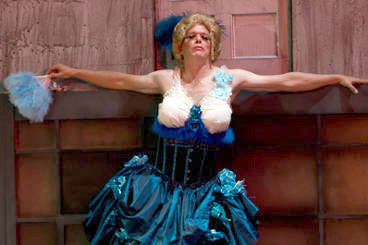
Too often the attempts at humor degrade to the merely vulgar, either in language - Luciana: "that's bullshit!" and Emilia: "welcome to the abbey, bitches" - or in crude sexuality, as when Adriana attempts to lift and carry the wrong Antipholus home for dinner, but crouches and embraces him as if performing fellatio. When she orders her sister offstage to fetch her a soda pop, Luciana returns in a huff, snaps the aluminum can open and guzzles it, telling her, "I'm gonna drink the shit outta this Diet Coke." The sexy courtezan in Graney's production is a burly man in drag, hairy and brutish, wearing huge black eyelashes and a piled-high blonde wig, plus a frilly blue bustier. And at the production's nadir, Dromio is dragged offstage right to be beaten by a furious Antipholus, and he reappears stage left, crooning a sad song about the woes of enduring blows from a master. The recurring refrain - "he blows me" - draws howls of laughter from the friends in the audience, as does the line, "when I'm on, he beats me off."
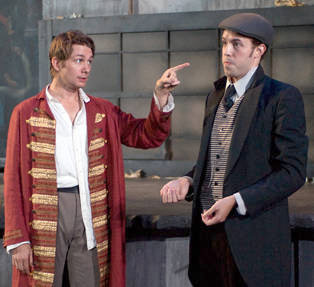
Among the cast, Alex Goodrich fares best in the dual roles as Dromio. His affable Syracusan in a striped clown shirt says "man" a lot, enjoys a triple-scoop ice cream cone, draws cheers from the audience just with his ball-in-a-cup game, and gives a tap dance of joy over his imminent escape while singing "the ship is in the trim." His Dromio of Ephesus is a rigid butler in tuxedo tails and tie, using a tape recorder to prove his obeying of orders and adding his own droll "quoth he" and "quoth I" to the recording. Erik Hellman does nearly as well as the Antipholi, playing the Syracusan as a quick-to-panic stranger in a strange land, and the more sophisticated twin from Ephesus as an angry and world-weary party-monger with a speech impediment, wearing a formal-tailed jacket with shirt and tie beneath a gray vest. The two actors share some good moments, such as when they gather their funds in a pink piggy bank or when they consult their faked passports, and Goodrich's Dromio inspires a laugh in his desperate attempt to get the ladies - in a balcony above stage left - to catch the desk keys he throws to them, then retrieves and tosses them over and over as they simply stare. The best moments of the production are the quick-changes affected by Goodrich and Hellman, suddenly appearing as their twin in another outfit with jaw-dropping speed.
Graney concludes the hyper-brief production on a sudden note, not even attempting the dramatic reunion of the two sets of twin brothers. After more 1970s variety show humor, with slamming doors and snarky asides from windows, a police officer enamored with Luciana exits in dejection with his flowers and stuffed-animal puppy. The Town Crier reappears with a new announcement - "we love Syracuse" - that saves Egeon and ends what passes more for a lame Saturday Night Live-style parody of Shakespeare than an attempt to bring a Plutarchian farce to a renowned classical stage.